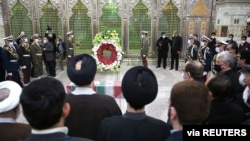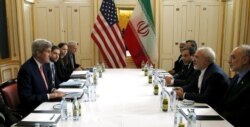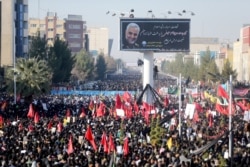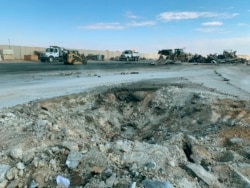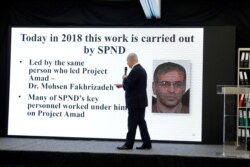Iranian President Hassan Rouhani has vowed to avenge the assassination of nuclear scientist Mohsen Fakhrizadeh — a killing he and other Iranian leaders blame on Israel. But some diplomats and analysts say they don’t expect Iran to retaliate quickly for the meticulously planned shooting Friday of the 59-year-old scientist, the second senior Iranian military figure to be assassinated this year.
Iran will bide its time following the death of Fakhrizadeh, who was widely seen as the father of Iran’s covert nuclear program, they suspect, fearing otherwise they might provoke a fierce military response from outgoing U.S. President Donald Trump.
Iranian leaders will also likely be considering whether retaliation will complicate President-elect Joe Biden’s plan to restart a diplomatic engagement with Iran.
“It would be a huge miscalculation heading into a Biden administration,” says Jonathan Schanzer of the Foundation for Defense of Democracies, a Washington-based research group. “If Iran were to carry out some kind of attack, or to engage in violent activities that were clearly attributed to the regime, it would, I think, represent a huge unforced error.” That is if Tehran’s “primary goal” is to get out from under the “maximum pressure” campaign being pursued against it by the Trump administration, Israel and U.S. allies in the Gulf, he adds.
Biden has said he wants to revive the 2015 international deal, the Joint Comprehensive Plan of Action, negotiated by his former boss, President Barack Obama, that saw the Iranians curtail their nuclear program in return for sanctions relief.
Trump unilaterally abandoned the deal, which was co-signed by Britain, France, Germany, Russia and China, in favor of a “maximum pressure” campaign against Iran.
Biden’s nominee for secretary of state, Antony Blinken, said at a conference in August he hoped the nuclear deal could be renegotiated to be “stronger and longer.”
But Schanzer cautions “the impulse for revenge” will likely be strong, especially as it is just weeks away from the first anniversary of the U.S. assassination of top Iranian general Qassem Soleimani, Iran's most important military strategist and tactician in Tehran's long-standing campaign to expand Shi'ite and Iranian influence throughout the Middle East.
His car was hit in a U.S. drone strike while it was traveling near Baghdad airport. U.S. officials say he was targeted because he had been behind attacks on American diplomats and military personnel and was plotting further attacks.
There were dire warnings from Iran after the assassination of Soleimani, a move David Petraeus, a former American army general, dubbed as “more consequential” than the killing of Osama bin Laden or of Islamic State leader Abu Bakr al-Baghdadi. Iran issued expansive threats with the Iranian military saying the U.S. would face “severe revenge which would make them regret their decision.” Some analysts warned the killing could set the entire region alight.
But the Iranians were circumspect in their response. Hours after Soleimani’s burial on January 7, the Iranian military did launch a missile strike against two Iraqi bases housing American soldiers in Iraq but no lives were lost, in part because the U.S. and Iraq were tipped off, according to U.S. and Arab sources at the time. An Iranian commander said Tehran had not intended to kill anyone.
“Iran appears to be standing down, which is a good thing for all parties concerned,” Trump said the following day. Western diplomats suggested Iran was cautious in its response because it feared a fierce U.S. counterstrike, one that might target members of the Iranian leadership.
Fakhrizadeh’s role behind Iran’s clandestine efforts to develop a nuclear bomb was highlighted by Israeli Prime Minister Benjamin Netanyahu in 2018. Fakhrizadeh was killed by gunmen in a daylight attack on the vehicle he was traveling in near the rural town of Absard, just east of the capital, Tehran.
Israel has not claimed responsibility but has also not denied being behind it. Military experts say the incident bears the hallmarks of the killings in Tehran of four Iranian nuclear scientists between 2010 and 2012.
Some Middle East experts say they doubt Fakhrizadeh’s slaying will impact Iran’s nuclear program.
“Fakhrizadeh was to Iran’s nuclear program what Soleimani was to its proxy network. He was instrumental to its development and the creation of an infrastructure to support it, ensuring that his death won’t fundamentally alter the course of Iran’s nuclear program,” tweeted Ariane Tabatabai, a Fellow and Middle East expert at the German Marshall Fund, a Washington-based research institution.
Tabatabai says she believes Iran will retaliate, noting that when it is going to respond it avoids identifying the perpetrators. “When it plans to respond [see Soleimani], it points a finger [it seems on track to do so here],” she tweeted.
Others say a response is likely but probably not for some time. “The Iranians can take up to one to two years to retaliate,” Olivier Guitta, a British counter-terrorism expert, told VOA. “They take their time and prepare their attacks very meticulously,” added Guitta, managing director of GlobalStrat, a security and geopolitical risk consultancy.
Israel has increased security at its embassies around the world and Jewish communities have also been told to maintain vigilance. Iran has attacked Israel’s diplomatic missions before. In 1992, following the killing of Hezbollah leader Abbas Musawi in southern Lebanon, an Iranian-directed team of bombers, said Argentine prosecutors, triggered a powerful blast outside the Israeli embassy in Buenos Aires, killing 29 people, including three Israeli embassy personnel and local civilians.
In 2012, bombs were planted on Israeli diplomatic vehicles in New Delhi, India and Tbilisi, Georgia. The Tbilisi bomb failed to detonate, but the one in New Delhi exploded and wounded one embassy employee. Israel accused Iran of being behind the attacks.
Other possible retaliatory action could involve an armed drone strike on Israel, launched from Syria, as happened in 2018, when an explosives-laden drone was shot down by an Israeli helicopter before reaching its target. The Israeli military has prepared for possible reprisals, including testing its air defenses for a long-range Iranian missile attack.
Nonetheless, Israeli officials, according to The Jerusalem Post newspaper columnist Anshel Pfeffer, may have concluded this was the “time to take out high-value targets” banking on the Iranians holding back from responding. He says Fakhrizadeh had been a potential target for years but the timing now likely was guided by Israeli intelligence assuming “Iran will not embark on a drastic course until the regime has a clear idea of the Biden administration’s exact policy regarding a return to the 2015 nuclear agreement.”
Schanzer agrees but says most likely "the primary concern was being able to take out targets of opportunity now before the window closes.”
According to Schanzer, “The Israelis might not have as much operational freedom as they do now under the Trump administration. This isn't to say that the Biden administration would ignore Israeli security concerns, or halt such strikes, but one does get a sense that they've got an unfettered green light right now from the Trump administration.”
U.S. officials have denied involvement in Friday’s killing.
There have been widespread predictions recently by diplomats and analysts that the outgoing Trump administration, Israel and Saudi Arabia would likely ramp up pressure on Iran. Last week, Netanyahu reportedly met in Saudi Arabia with Mohammed bin Salman, the Saudi crown prince, and U.S. Secretary of State Mike Pompeo. The Saudis denied the report and Netanyahu refused to comment.




